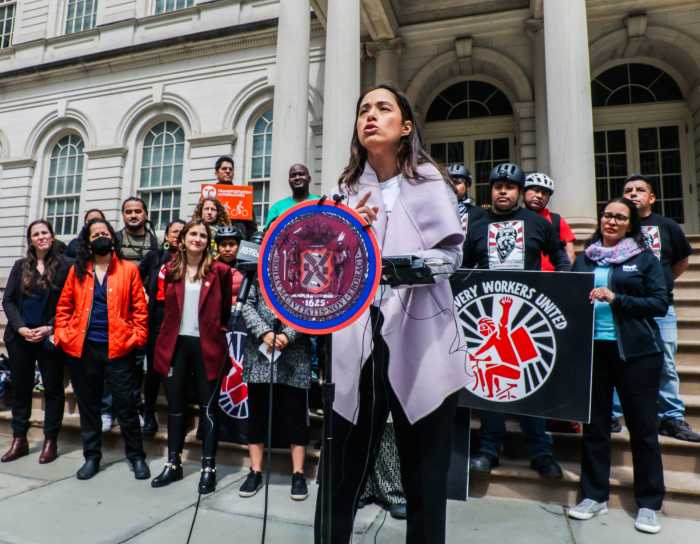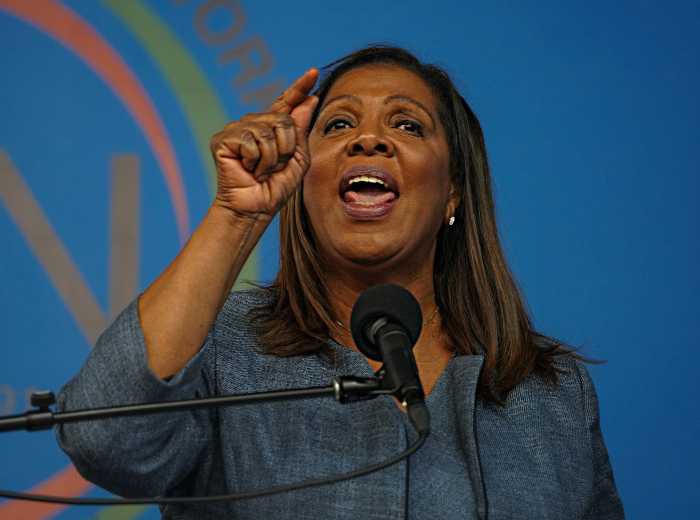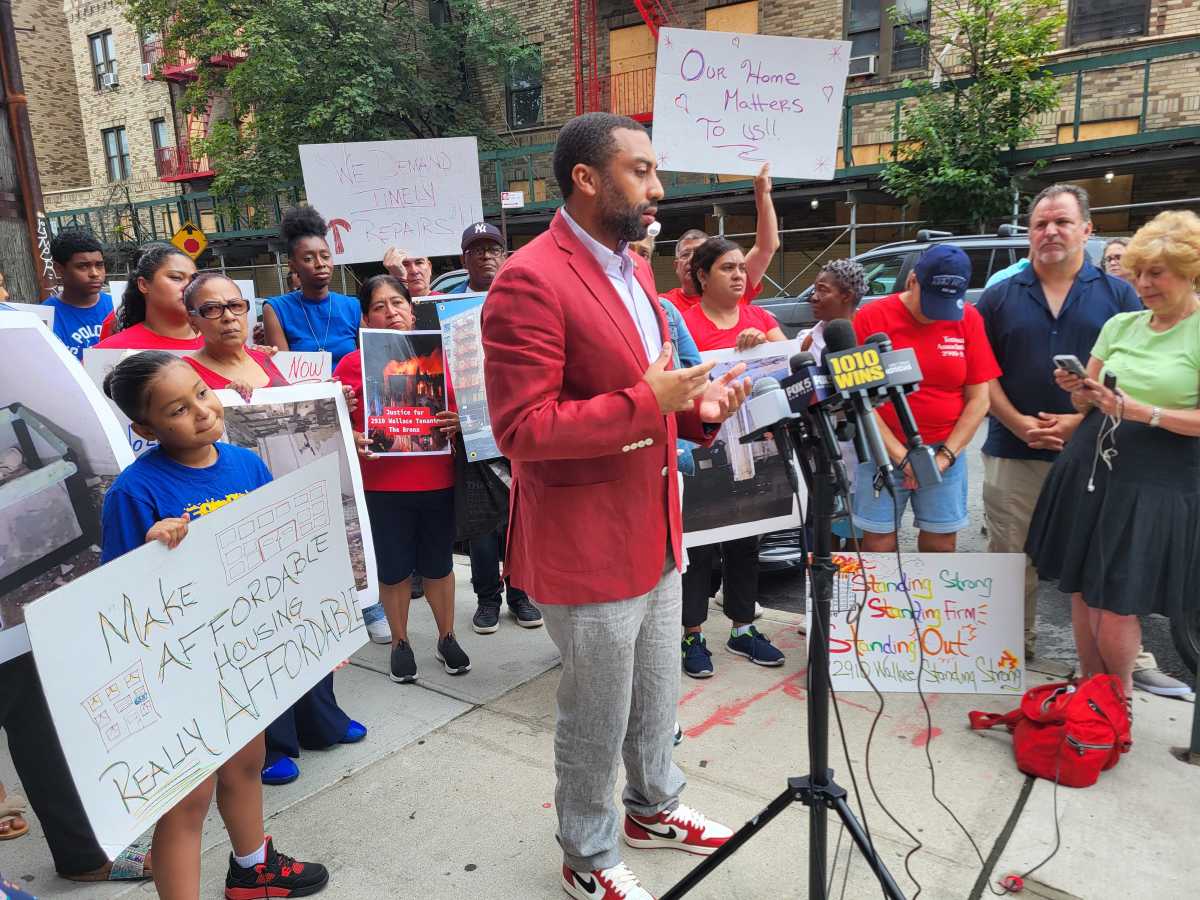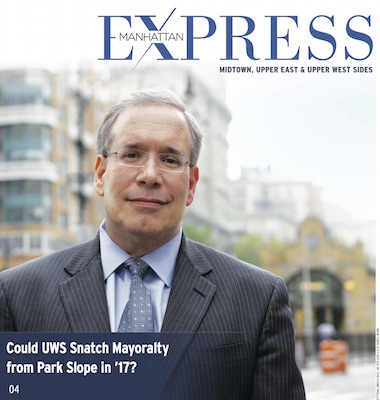
BY PAUL SCHINDLER | “I would like to give the mayor more runway space to accomplish the goals he has set,” declared City Comptroller Scott Stringer toward the end of a wide-ranging, 50-minute interview early this month with Manhattan Express and editors from the newspaper’s sister publications in Manhattan, Brooklyn, Queens, and the Bronx. “My job is not to hold him back from what he wants to accomplish. My work at the end of the day has to complement the administration.”
Those comments were Stringer’s effort to put some perspective on his discussion of a series of high-profile clashes — over pre-K contracts, half a dozen audits of the New York City Housing Authority (NYCHA), an audit of Department of Education federal Medicaid reimbursements, and most recently homeless shelter contracts — he’s had with Mayor Bill de Blasio and his administration.
Then, in a model of good Democrat, team player behavior, Stringer — who has served as comptroller for nearly 22 months after eight years as Manhattan borough president and 13 years as an Upper West Side State Assembly member — said of the chances de Blasio might have a challenger in 2017, “I expect him to be the candidate. I hope to be the candidate for reelection, and we’ll go from there.”
Stringer’s loyalty and clarity here, though, were in contrast to what was — at the very least — some troublemaking earlier in the interview. Explaining why he was happy to meet with reporters in an “open mic” set-up, he said, “I do think that elected officials, whether you are the mayor, you’re the comptroller, I do think you should go before the public. I think you should do town hall meetings — not just in Iowa, but in New York City.” Then, a pause, and in something of an exaggerated stage whisper, “Oh, God, I forgot I’m in front of the press.”
Weeks before, news had emerged that de Blasio, who has worked to forge a national profile as a spokesperson for urban America generally and progressive policies in particular, plans to host a Democratic presidential forum in Iowa, site of the first-in-the-nation caucuses. Stringer could be forgiven some West Side wise-guy humor.
But when asked if he were taking a more serious poke at the mayor, Stringer denied that “we sort of knock him when he’s on the ropes” — and then said, “Do I think the mayor should have a town hall meeting in Iowa? Sure. I don’t begrudge him that. Mayors want to go beyond the street corners in the city. What I’ve said is just, ‘Keep in mind, keep your eye on the city.’ Right? We have a homeless crisis. We have an education crisis. We have a NYCHA system that is slowly eroding and broken, and you really have to think about being mayor in a 24/7 city that you just shouldn’t get so far ahead of yourself.”
And then, making it abundantly clear that the de Blasio junket was not just fodder for an early October joke, he explained, “What I’m going to do is to use that town hall meeting to do a town hall meeting the same night in New York City. And I’m going to bring together advocates and activists, people to talk about an urban America agenda but through the lens of our city. To talk about solutions to homelessness, to talk about solutions to making sure that people in our housing developments feel secure, to talk about affordable housing. So we all have different roles to play, and that’s something I’m going to do.”
Throughout his discussion of the audits and contract oversight that his office has done — and the frictions they have created with the mayor and city agencies — Stringer returned again and again to explanations based on his job responsibilities. He has fiduciary duties regarding both the city’s massive pension funds — which total roughly $155 billion and provide retirement security for 700,000 people — and the thousands of contracts his office must sign off on. As an independently elected official, he has an obligation to hold city agencies accountable. To the extent his office has been aggressive — with audits “very focused on financial impropriety and incompetence,” he said — it was all in the service of sound management and guaranteeing New Yorkers, particularly the neediest among them, the services they deserve.
“We’re not the people that you’re supposed to invite to the party, right?,” Stringer said by way of closing. “We’re the ones who have to blow the whistle, say the things that people are thinking but nobody is saying.”
If one accepts the comptroller’s version of the facts in the dust-ups he’s had with the administration, this perspective is compelling and Stringer makes his case ably. His comments about holding a not-in-Iowa forum, however, seem to go well above and beyond the standard he lays out for his role as city comptroller.
So what’s Scott Stringer up to?
Longtime political consultant Hank Sheinkopf agreed that the comptroller’s response to de Blasio’s planned Iowa forum signals a ratcheting up in the rivalry between the two Democrats. Stringer’s comments, he said, “are absolutely provocative,” and he added, “There is no doubt that this is a way to step on the mayor’s parade…. The fact that he has the temerity to hold a forum here while the mayor is holding one elsewhere is pretty significant.”
Alluding to an August poll by Quinnipiac University, Sheinkopf said, “Public opinion polls show people are worried that the mayor is more interested in issues outside than in New York, and they don’t like it. Scott is a very good politician, and he surrounds himself with great people. They are aware of the way the wind is blowing. There’s an electorate who doesn’t want to see the mayor outside New York, so he sets himself up as a sort of mayor in loco parentis.”
Mitchell Moss, a longtime urban policy, planning, and transportation expert at NYU’s Wagner Graduate School of Public Service who advised Michael Bloomberg on his first run for mayor, has also noted Stringer’s high profile as comptroller, crediting him with “expanding the role beyond bookkeeper.”
“He has a huge fiduciary role in the pension funds,” Moss said. “He expands it with the audits. It allowed him to become a highly visible city official. His official duties give him a platform to comment on social issues. A very broad platform.” That platform, he said, would most likely serve Stringer in a race in 2021 — not 2017 — when he would be able to position himself as “a moderate figure of prudent fiscal oversight” — a characterization also made by Sheinkopf — as compared to more left-leaning candidates who are now, like the comptroller, waiting in the wings.
Moss did concede that Stringer talking about an “urban agenda” forum to compete with the mayor’s presidential forum in Iowa “is obviously bigger than that.”
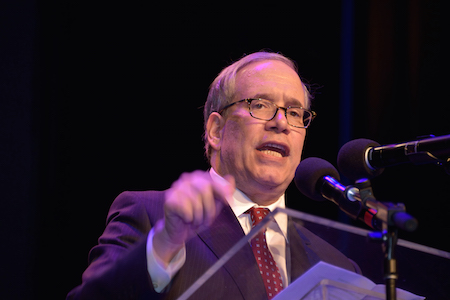
But Moss’ bottom line — which was no different than Sheinkopf’s or the view of Ken Sherrill, a retired Hunter College political scientist, and George Arzt, who owns a communications and lobbying firm long active in city politics — was, “It’s very hard to defeat an incumbent mayor.”
Having worked for David Dinkins, who lost his re-election bid to Rudy Giuliani, de Blasio has “a very sophisticated understanding of what it takes to get reelected,” said Moss, who added that seeing Dinkins get only four years taught de Blasio how vital eight years are. Continued low crime and a strong economy are “working for the mayor,” he added, “making him very hard to defeat.” And recent moves like expanding Staten Island ferry service to every half hour, 24 hours a day, Moss said, show “he understand he needs to reach out beyond his base.”
From Sheinkopf’s perspective, a significant reversal in the city’s crime rate would probably be required to make de Blasio vulnerable in 2017. “Voters want to have the feeling the mayor is there when they turn the lights off,” he said. “When they don’t feel secure, that’s when they react.”
Arzt, who has worked in the past for both Stringer and de Blasio, said of Stringer running for mayor in two years, “I don’t think he’s thinking about it. He is looking four years hence.” Other city officials — Bronx Borough President Ruben Diaz, Jr. and Public Advocate Letitia James, among others — he said, would also like to run for mayor. But to do so in 2017, Arzt argued, “They would have to give something up [their current office]. That takes courage.” His conclusion is that barring “a complete cratering of the mayor, they’re not going to run.”
From the perspective of Sherrill, who has known Stringer since 1977, the comptroller, whom he credits as one of the “most astute politicians around,” is playing a long game.
“Scott is doing these things and putting them in the bank,” he said. “And at some time he will take it out of the bank and spend it. The fact that he’s amassing political capital and the fact that he’s showing everyone he can beat the mayor up is all to his benefit when he decides to use it. I think it’s more likely that he’ll do it in six years than two.”
For all the experts’ discounting of Stringer’s near-term ambitions, they all acknowledged that in this game the future is rarely foreseeable. “Anything can happen in New York City politics and does,” was how Sheinkopf put it. And though Moss sees the mayor as holding a strong hand politically, he also suggested it’s far too early to think about 2017. The narrative for that race, he said, won’t come together until after next year’s presidential election.
In Sherrill’s view, Stringer “never closes the door to opportunities. Political people game things out in their minds almost for pleasure, the way sports addicts do. And lots of what-ifs and suppose this were to happen, suppose that were to happen. And I’m sure that Scott has played out all sorts of scenarios, no matter how implausible. Does this mean that he’s serious about this? No, he loves politics and he thinks about it recreationally.”
Stringer, however, knows all too well that unexpected opportunities can present themselves. In 1992 he was working for Jerry Nadler, who was then a member of the State Assembly. When West Side Congressmember Ted Weiss died unexpectedly the day before the primary election, it was Stringer, Sherrill noted, who managed the floor fight at the county Democratic meeting that ensured that Nadler’s name replaced Weiss’ on the November ballot.
“Having been through that once,” Sherrill said, “it’s like a being a Boy Scout — always be prepared.”
Referring to recent Quinnipiac polls that show approval for de Blasio dipping as low as 37 percent, Sherrill said, “He’s undoubtedly weakened. But the mayor’s situation isn’t fatal. Lots of people as they’ve moved toward the end of the second year of the first term weaken and then rebound.”
In Arzt’s view, de Blasio’s major vulnerability is the erosion of support for him among white voters, and he said the mayor could have trouble in the outer boroughs and even in Brooklyn’s brownstone belt that is home to him.
But even if Stringer is emerging as something of a “moderate” — as Moss and Sheinkopf characterized him — his progressive bona fides are solid and nothing in his career suggests he would try to capitalize on any racial polarization in the New York City electorate. And his political base is not in the outer boroughs, but rather on the Upper West Side, which plays a disproportionately large role in Democratic primary turnout.
The issues on which the mayor and the comptroller have clashed have largely been about delivery of the progressive vision de Blasio promised.
“The reason I’m focusing on NYCHA is this is where poor people live,” Stringer said of his half-dozen audits of the Housing Authority. “And if we let NYCHA collapse, then we are going to hurt a lot of great New Yorkers who live in public housing who will never have a chance, whose kids will never have a chance.”
Though the comptroller, in remarks last month outside a Fort Greene public housing project where three men were killed when gunfire broke out, did criticize “politicized statistics” on crime, Stringer is not in the crowd dogging the mayor over the problems he’s had with NYPD rank and file.
Instead his critiques are technocratic and focused on the issue of “competence,” with his audits and actions on contracts repeatedly leading to a war of factual claims between his office and the administration.
Talking about the Housing Authority, Stringer said, “This administration’s 26 reform proposals for NYCHA are basically old recycled proposals from mayors past. There’s only six new proposals… And what we have to do with NYCHA if it’s going to move forward, we need to bring sunlight into the budgeting process.”
At times, NYCHA has pushed back hard on the numbers the comptroller used in his audits, charging they did not reflect the changing reality at the agency. But Stringer and NYCHA chair Shola Olatoye have also found some common ground and even opportunities to compliment each other’s work — though Sheinkopf, for one, criticized the comptroller for not giving Olatoye the credit she deserves for yeoman efforts at turning around the troubled agency.
Significantly, when he talked about NYCHA, Stringer took time to praise Bronx Councilmember Ritchie Torres, chair of the Public Housing Committee and one of the most consistent progressives on the Council.
If demonstrating his ability to deliver on policy goals is important to Stringer, so too is proving his political acumen. When asked for his assessment of the ongoing rift between de Blasio and Governor Andrew Cuomo, he said, “The city can’t play checkers. The city has to play chess. So yes, you can go out and smash-mouth Cuomo, but that’s playing checkers. You gotta use every chess piece to get resources for the city, and that’s the way its been since Rockefeller.”
Scott Stringer is not Ed Koch, a one-time progressive who became the voice of angry and socially conservative outer borough voters when he snagged the mayoralty in 1977. In fact, as NYU’s Moss pointed out, he is the last, best hope of Upper West Side progressives, who now have, he said, a very thin bench. Among all the would-be mayors in New York, Stringer, Moss argued, is the only Manhattanite. The comptroller understands the vision for New York that voters embraced two years ago and there is no reason to expect the challenges his office poses to de Blasio to stray from questions about the transparency, efficiency, and effectiveness of the administration delivering on that vision.
Whether his critique of the mayor in time rises to the level of a complete political rupture remains to be seen. There is no doubt, however, that Stringer will do everything he can to make voters understand that if that time comes, he is ready.



